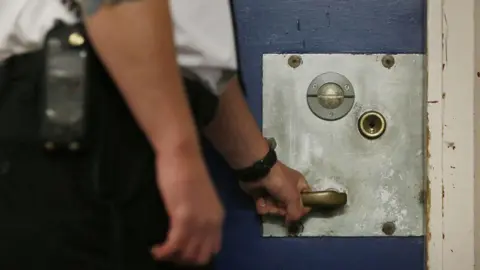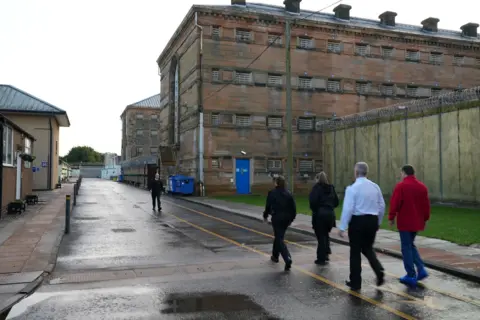More than 150 violent offenders released early in Scotland
 PA Media
PA MediaAlmost half of the prisoners released during the latest attempt to ease overcrowding in Scotland's jails were serving sentences for violent crimes, new figures show.
The Scottish Prison Service (SPS) has revealed that 312 inmates who had completed 40% of their sentence were allowed out of jail to free up space in February and March.
Of those released, 152 had committed non-sexual crimes of violence.
The SPS said the move to release prisoners early had provided some respite but, with a rising population, further reductions were needed.
Following a new emergency law introduced in February inmates sentenced to less than four years can be freed after serving 40% of their term, rather than 50% when the scheme was first brought in last year.
Prisoners serving sentences for domestic abuse or sexual offences are excluded.
The prison service had estimated up to 390 could be freed straight away.
But SPS data shows a total of 312 inmates were in fact released, over three phases, between 18 February and 20 March.
This included 140 between 18 and 20 March.
A breakdown of the data shows 92% of those released were men and the majority were serving sentences between one and two years.
A total of 152 of the people released had committed non-sexual crimes of violence.
A further 69 had committed "crimes against society" and 52 were in jail for crimes of dishonesty.
Data on how many of those who were released early in this tranche and then ended up back in custody will be released later this year.

A SPS spokesperson said: "We released people through these tranches in a way which prioritised the safety and wellbeing of those in our care, victims, and the communities we serve.
"While these releases have provided some respite, our staff continue to manage an extremely high and complex population, with eight prisons now at red risk status, and the number of people in custody set to rise even further.
"This has an increasingly destabilising effect on our establishments, with staff unable to do the critical work of building relationships and supporting rehabilitation, and prisoners frustrated by the impact on their daily lives and the opportunities available to them."
Scotland's largest prison, HMP Barlinnie in Glasgow, released the highest number of prisoners (65) under the latest early release scheme, SPS data shows.
The Scottish government said the prison population had become "more complex and risen significantly recently".
A spokesperson said the SPS budget had been increased by 10% to £481.5m in 2025/26 in a bid to address the challenges facing the sector.
The point of release was also changed from 50% to 40% of a prisoner's jail term.
A spokesperson said: "Most of those released were serving sentences of less than two years, therefore, their release was less than three months ahead of their original date.
"The Scottish government considers that this is a proportionate change which is bringing about a sustained reduction in the prison population and relieving some of the acute pressure on the prison estate."
Why are prisoners being released early?
In February last year, a BBC Scotland documentary revealed how the SPS had concluded its jails were too full and were reaching a "tipping point" where emergency powers could be needed to release inmates early.
Last summer 477 prisoners were released but 61 of them ended up back in custody before their original planned release date.
Within two months, according to SPS data, the overall prison population had again risen above the level at which the releases began.
More than 1,700 prisoners were also released early in England and Wales last autumn as part of a similar attempt by the UK government to ease overcrowding.
At the end of last week, there were 8,136 inmates in Scotland's prisons – above the total design operating capacity of 7,805.
Of the 17 prisons in Scotland, a total of eight are at red risk status, which means the SPS believes they are struggling to cope with the demands placed upon them.
